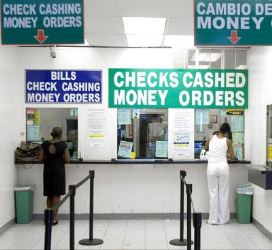Latinos Keep $169B Out Of Banks
CHARLOTTESVILLE, VA -- A new study released by the University of Virginia Darden School of Business and its Tayloe Murphy Center outlines specific steps for how banks and credit unions can capture billions of dollars in deposits by reaching out to Latino and other "unbanked" households across the United States.
 The year-long study also demonstrates for the first time that persuading households to keep their money in banks and credit unions could lower the risk of robberies and raise property values.
The year-long study also demonstrates for the first time that persuading households to keep their money in banks and credit unions could lower the risk of robberies and raise property values.
Nationwide, there is more than $169 billion floating outside the formal banking system attributed to unbanked households, of which $53 billion comes from unbanked Latino households.
"This study gives the financial services industry, policy makers and market watchers information they can use and a real measurement of the scope of this hidden market. At the same time, it not only represents a significant financial opportunity, but also highlights the wide-ranging benefits for communities," says Greg Fairchild, executive director of the Tayloe Murphy Center and Darden professor.
The study , "Perdido En La Traduccion: The Opportunity in Financial Services for Latinos," focuses on unbanked Latino households in Virginia and North Carolina.
Latinos are the fastest growing multi-ethnic group in many states, including Virginia, as well as nationwide.
Many of the findings can also be applied nationally to any household that is unbanked, regardless of ethnicity, background, geographic location or length or status of residence.
California, Texas, New York, Florida and Georgia are the top five states for the greatest amount of money kept outside of banks and credit unions by such households, according to the FDIC's full list of yearly income of unbanked households by state.
"Using rigorous statistical analysis, qualitative field research and case study, we focused on the challenges of serving Latinos and other unbanked households as well as how banks and credit unions can reach this market nationwide," says Kulwant Rai, research director at the Tayloe Murphy Center.
Rai presented the study for the first time in Los Angeles at the National Federation of Community Development Credit Unions' 37th Annual Conference on Serving the Underserved.
In Virginia, the Tayloe Murphy Center found 39,000 unbanked Latino households, with an average yearly income of $23,500. That adds up annually to almost $917 million unbanked by Latino households.
Much of that unbanked money is serviced by community grocery stores and markets, called "Las Tiendas" in the report. Las Tiendas offer check-cashing, wire transfers and bill paying with significantly marked-up service fees.
For answers on how to capture those billions in deposits and provide unbanked households more control of their finances, Tayloe Murphy Center researchers examined a North Carolina-based credit union established in 2000 called the Latino Community Credit Union (LCCU).
LCCU was chosen because its membership is one of the fastest-growing of any credit union in the nation. From 2000-2009, the number of LCCU depositors soared from 917 to 53,073. It achieved its success through a strategy that makes Latinos feel comfortable and educates them on how banking services are beneficial.
Researchers found an added incentive in the credit union's approach to banking; because of their tendency to carry cash, unbanked households, especially Latinos, are often the victims of violent robberies.
"I used to carry my money and hide it in small packets at home. It wasn't until I was robbed at gunpoint with my son at my side that I realized I needed to put my money in a safer place," says Roberto Maya, an LCCU member since 2000.
Maya says LCCU representatives made him feel welcome and spoke to him in Spanish. While he was initially concerned about acquiring debt, LCCU provided financial education workshops where he learned how to obtain his first loans.
"At LCCU, they helped me understand how things work and made me feel comfortable," Maya says. "In the last 10 years, I built my credit history, bought my first home and started a painting business."
Maya's experience at LCCU is far from unique.
The Tayloe Murphy Center reviewed statistics from 1990-2008 that found each time LCCU opened a branch in North Carolina (in the counties of Durham, Mecklenburg, Wake, Guilford and Cumberland) the number of robberies dropped by an average of 57 per year, almost 4 percent in each county.
Further, the decline in crime led to a dramatic increase in property value in those same counties. The opening of LCCU branches from 2000-2008 is credited with raising property values by 4 percent compared to the total appreciation, or $9.8 billion.
"The study is about more than just showing banks and credit unions how to connect to this powerful and growing market," says Fairchild. "At the Tayloe Murphy Center, we seek to conduct research that can create economic and community uplift and transform underserved areas and groups."










